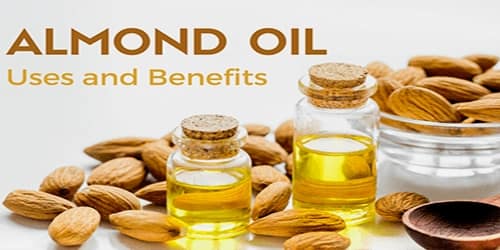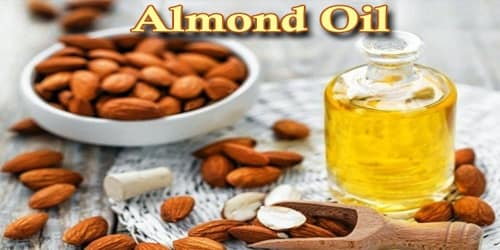Almond Oil
Introduction: Almonds are the edible seeds of the Prunus dulcis tree, more commonly known as the almond tree. Almonds are commonly referred to as nuts, they’re actually the seeds found at the center of the almond fruit, which closely resembles a peach.
Ripe almonds are pressed to extract the oil with minimal heat. This unrefined almond oil protects the nutrients and the flavor of the oil. High heat and sometimes chemicals are used to create refined almond oil.
Technically, there are two kinds of almond oils — bitter and sweet. The bitter oil is extracted after pressing bitter almonds. They contain amygdalin that turns into toxic hydrocyanic acid after processing. Despite its medicinal properties, bitter almond oil cannot be ingested. This oil can be used for topical application only. Whereas, sweet almond oil is made from edible almonds. This oil is used extensively for skin and hair and for culinary purposes too.
Almonds are a rich source of oil, with 50% of kernel dry mass as fat. In relation to the total dry mass of the kernel, the almond oil contains 32% monounsaturated oleic acid (an omega-9 fatty acid), 13% linoleic acid (a polyunsaturated omega-6 essential fatty acid), and 10% saturated fatty acid. Linolenic acid, a polyunsaturated omega-3 fat, is not present.

Almond oil is an excellent source of vitamin E and contains a small amount of vitamin K.
Most of the health benefits related to almond oil stem from its high amount of healthy fats.
Fatty Acid Breakdown –
Here are the proportions of fatty acids found in almond oil:
- Monounsaturated fat: 70%
- Polyunsaturated fat: 20%
- Saturated fat: 10%
A diet rich in unsaturated fats has been linked to many health benefits, including a reduced risk of heart disease and obesity
Uses and Health Benefits of Almond oil: Almond oil is full of vitamin E, and it’s a great source of magnesium, phosphorus, and copper. The antioxidant-rich oil is known for its free radical fighting abilities. It’s also anti-inflammatory and boosts immunity. It has been linked to a wide range of potential health benefits, including lowering the risk of heart disease and stabilizing blood sugar levels.
Skin Benefits of Almond Oil:
Almond oil has been used for centuries to soothe the skin and treat minor wounds and cuts. It has been used in ancient Chinese and Ayurvedic practices to treat skin conditions like eczema and psoriasis.
Almond oil is not only cleared complexion but also imparts a warm glow to the skin. It nourishes peoples skin and makes it smoother and softer. It is antibacterial and full of vitamin A, almond oil can be used to treat acne. Its concentration of vitamin E can also help to heal sun damage, reduce the signs of aging, and fade scars.
The moisturizing effects of almond oil may be especially helpful for people who have dry or sensitive skin.
Sagging skin. Baggy eyes. Dullness. These words are an absolute horror for girls. Regular application of almond oil on girls skin makes them skin feel younger and fresher within no time. The vitamin E and fatty acids present in this oil reverse and prevent signs of aging. It not only helps skin renewal but also fights wrinkles.
Almond oil soaks in quickly and is a powerful moisturizer, so it can be used on the face or body. People can apply it straight, or mix it with essential oils to get its benefits. Beyond moisturizing people’s skin, almond oil is a great massage oil or skin treatment.

Hair Benefits of Almond Oil:
The nourishing oil can soften and strengthen people’s hair. It’s rich in vitamin B-7, or biotin, so almond oil helps to keep hair and nails healthy and strong. It can also help protect people’s hair from sun damage, with a natural SPF 5.
Unhealthy hair is never a good sign. But the dirt and pollution, along with our busy schedules, make it worse. Regular massage of hair with this oil can prevent split ends too. Mix almond, castor, and olive oils in equal proportions and massage your hair with this mixture. Apply it once or twice a week, and feel the difference.
People can use almond oil as a scalp treatment. Its antibacterial and fungicidal properties make it effective at balancing the yeast that causes dandruff. It easily soaks into the skin, so almond oil works well at hydrating the scalp and cleansing the hair follicles.
Health Benefits of Almond Oil:
Almond oil is a mild, nutty-tasting oil that makes a great addition to many dishes. Unrefined almond oil should not be used in cooking, as high temperatures can destroy its nutritional value. Refined almond oil has a higher smoke point of 420°F (215°C) and can be used for cooking methods like roasting and sautéing.
Almond oil is best used for salad dressing, low-heat baking, or as finishing oil on top of a dish to add extra flavor and nutrition. Its mild flavor makes it perfect for slipping into dishes.
Almond oil is loaded with monounsaturated fatty acids. These fats boost heart health and prevent cardiovascular diseases. Sweet almond oil is rich in folic acids, unsaturated fats, protein, and potassium – all these have been proven to be beneficial to cardiac health.
Almond oil helps keep Type 2 Diabetes at bay, restores liver health and maintains a healthy heart. It also regulates blood pressure and maintains the cholesterol levels.
Almond oil is a great source of vitamin D that is required for the absorption of calcium in the body. And obviously, calcium is extremely vital for a newborn, as its bones need to develop and strengthen.
Almond oil may promote heart health, stabilize blood sugar levels, prevent free radical damage and help people maintain a healthy weight. Unrefined almond oil retains more nutrients than refined almond oil and is better for culinary uses. Just make sure people don’t heat it, as doing so will destroy some of its nutrients.
Information Source:
















